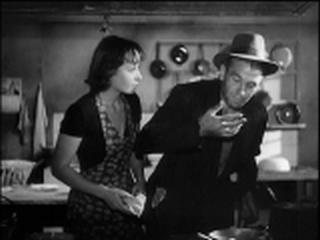Ossessione

For a director who would later develop a style so personal and more astutely political, Ossessione is remarkable for its faux noir trademarks: murder and intrigue on a low budget. It's Visconti's later works that address Italian politics during times of crisis and the manner in which the aristocracy responds to them, most blatantly in The Leopard but elsewhere in less pronounced fashion. Ossessione is a simple, straightforward story about a drifter who comes between a man and his wife, and the consequences one faces when money is an issue. The stakes are love and theft and the means are the perfect crime. The determination with which Visconti picks apart romantic affairs is at times excruciating, but nonetheless emblematic of couples struggling furtively toward happiness or some semblance of it.
This film hinges on varieties of guilt, theft and deception. Drawing on Dostoyevsky's suspicions about human psychology, Visconti makes a tense film about criminals and those who would be criminals. Seen as a morality play, Visconti plays his hand much further in favor of "justice" than he would in his second film which confronts directly the class struggle in Sicily. As such, the conflict between the lumpen beggar and the petit bourgeois is trivial and a bourgeois struggle at that: fights over women are seen as transfer of property and Bregana and Gino treat her as such. Giovanna is perhaps underdeveloped as a failure to understand more completely her anxieties, which seem facile compared to the "risks." But like Lady of Shanghai, one can read into Giovanna a more sophisticated narrative that imparts an insufficiently calculated plot to use the men in her life to gain independence.
In fact, Giovanna never gets chance to explain herself. From her lovelorn confessions to Gino, we're led to believe that she's been a prostitute, noting that men never have to prostitute themselves in the same way (in the context of this film, at least). Nor does Gino have to beg; he can hitchhike and pick up odd jobs on waterfronts, as a sandwichboard bearer, or as a mechanic. Visconti begins to develop his class orientation in public and rather than obfuscate his vision with his own incriminating class status, he proceeds with moral conviction. As a romantic and a humanist, Visconti tells the story of love through the class lens using Giovanna to show how not only women, but also love itself is treated as a commodity to be openly traded and cheapened by jealousy and murder.
While it's unfortunate that the film's third act ends so simply and abruptly given the trajectory and experience of the second act, but maybe those possibilities weren't as apparent to the novice filmmaker. It's clear from the outset that Gino and Giovanna are star-crossed lovers whose sins will be remedied by tragedy and suffering, but until the climax, it's not clear how their love will end. As Visconti grew into a more sophisticated filmmaker, he began to realize that there were things worse than death that take on many forms, some more cruel than others. For brothers-in-arms Gino and Bregana, it was a mortal struggle for to parade Giovanna as they might prize livestock, and sadly, like an animal even in death she can only submit.

0 Comments:
Post a Comment
<< Home